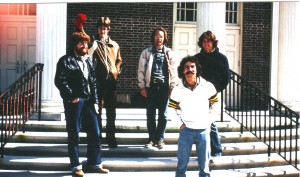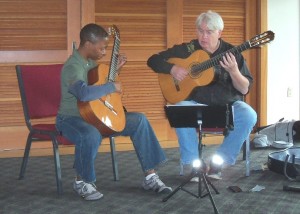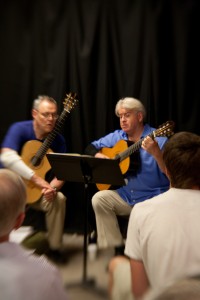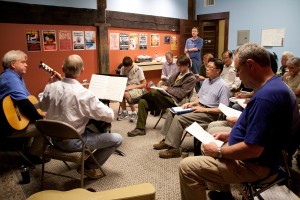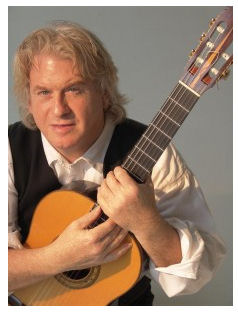Table of Contents for Getting More
- Getting More out of Your Guitar Lessons
- Getting More from a Master Class
When preparing for a master class, whether you plan on auditing or performing, proper preparation can make a big difference in what you learn from the masters. The following are ideas I’ve gained from decades of auditing and performing in master classes, as well as giving them. My hope is to show you how to best prepare, whether you plan to audit or to perform.
Audit or Perform?
The first thing to decide is whether to audit the master class or perform. Auditing means that you won’t be playing for the artist, which doesn’t mean you’ll learn any less. In fact, so much attention is spent on the issues of performing, that a performer can become distracted and miss what is said to other performers. As an auditor, you’re in the “cat bird seat” — you get to watch all the action without suffering the pangs of performance anxiety. In fact, with some preparation, you can learn a tremendous amount from auditing. Here are some points to make auditing more effective.
Auditors
Try to find out what will be performed by the performers ahead of time, and bring copies of the music. You can make notes and follow along with the master class lessons. Your notes will become a valuable resource if you ever decide to play that work— or, if you’re a teacher, if you ever teach that work.
Also, bring a notepad. Take copious notes. Write down everything! You never know what might be useful. I keep a nice hardbound notebook at my side at concerts and classes so that I can write down any ideas that strike me. I was reading through some of my books from 1977 last night, and was reminded of some good ideas!!
When a performer is first playing his or her piece, try to imagine what the master might have to say. Write down what you yourself might say to that performer. These can be positive statements or constructive criticism. It might be interesting to compare what your thoughts and the master’s thoughts were.
As you take notes, imagine that you are preparing these as a report, to someone who was not in attendance. You’ll tend to take stronger notes this way. If you feel you got down some good ideas, you can offer to photocopy them for the performer.
Do your research on the teacher leading the class. Listen to his or her recordings, and watch him or her play on YouTube. From your observations of the teacher’s performances, pick three skills that you’d like to borrow from his or her playing. Write these down, and if you get a chance, ask the teacher how he or she would recommend you learn these specific skills. You may not get all three points covered, but at least you can try.
Lastly, prepare a piece as if you were going to perform in the class. When I was preparing to travel to New York to study with Michael Lorimer for my recording Romance for Guitar, he reminded me of something very interesting. He said that “preparing for our work together is where you’ll gain the most progress.” I observed that once our sessions were set, my practice took on a new focus. So, follow the instructions for performers listed below for your own piece. You’ll gain big insights into the teacher and make almost as much of a gain in your playing as a performer will.
Performing
Obviously, as a performer, a big weight is on your shoulders in making the master class a success. Your preparation for this event is really unlike any other. Where else do you perform where you expect not only immediate feedback, but must welcome the criticism in front of your peers?
But big challenges usually come with big rewards. Your preparation for performing in a master class will also be a boost to your playing. Here are some helpful hints.
How to Pick a Piece
First, start with a list of your best repertoire and begin choosing some pieces. I like to have more than one piece picked to play (you may show up and find that someone else is already playing a piece you’ve chosen). But it’s important to select from your best repertoire. I’ve often heard students say they want to play something new from their repertoire so that they can start off with the right ideas. The problem is that this usually brings up some pretty rudimentary issues that we all can see. Playing one of your best pieces will challenge the master! In most cases, you’ll be pleasantly surprised to get some amazing insights that we all can benefit from.
From your list of well-prepared pieces, (and this means memorized at least, and hopefully seasoned from other performance experiences as well), select a piece that represents the artist’s own repertoire. Most concert artists are known for certain pieces, or at least for knowing certain musical periods better than others. Pick something from this area.
Do Your Research
Does the artist have a recording of these works? Is there a Youtube video of his or her performance? Does he or she have a published edition of this work? If so, find these and steal ideas; make note of tempos, timbre changes, and phrasing. And of course play from the artist’s own edition when possible. Try to sound exactly like the artist. Don’t be afraid of ‘tarnishing’ your playing by stealing ideas. You won’t sound as much like the artist as you think. I once prepared a work with three other students. Our assignment was to steal all of Segovia’s ideas and mannerisms for a particular piece. It was astonishing; no one sounded the same! Everyone had their own take on what they heard, and especially how they articulated the music. So don’t worry—you will sound unique.
If you focus on stealing the artist’s ideas, two things will happen: first, you will have already given yourself a mini-master class, and secondly, the teacher will be impressed with how well you play the piece! The result is that you’ll get deeper insight from the artist than would someone less prepared.
As I suggested to the auditors, find three notable aspects of the artist’s abilities that you would like to add to your own playing. You may be surprised, if your preparation is strong, to find that by the time of the master class you’ve already begun to manifest these skills in your playing! Also, be prepared to ask questions around these subjects.
Prepping the Piece
Study the score for tempo, dynamics, and phrase markings. It’s surprising how you can forget these when you’ve been playing a long time from memory.
Speaking of boosting your memory, make sure the piece is well memorized. You’ll often be asked to start and stop the piece in different places. Nothing drags down a master class like someone who gets stuck. I suggest the technique I call “Backward Sectionals,” where you learn to play the piece phrase by phrase from end to beginning.
The Day of the Master Class
When you arrive, find out the order of performers. If you get a chance, get up on stage early and try out the chair, using your support(s). If you have an opportunity to meet the teacher, do so. Tell him or her that you’re excited about the opportunity. This might be a good time to inform the teacher of the pieces you’ve selected, and let it be known that you’re flexible. Make sure your guitar is tuned to A=440, that your nails are in good shape, and that you have your music and support (footstool or otherwise) ready. You never know if you’ll be called out of order.
When you’re playing, relax. We’re all in this together, and the less nervous you are, the better you will be able to assimilate information. (If you’ve taken one of my Performance Anxiety Workshops, you’ve learned some tools for this). Don’t expect that you’ll play better than at home; in fact, you’ll probably play a little worse. As I said at the beginning, playing in a master class is a strange mixture of performance with the expectation of criticism.
Master Class Etiquette
I like to bring a clean photocopy of my music, along with the original. Pull the photocopy from the original. Performers are sensitive to people stealing music by photocopying originals, and if you have nothing but a photocopy, they may assume you didn’t buy the original. And if you haven’t done so, for goodness sake, buy the original. A clean photocopy means one that is free of your previous teacher’s markings.
If you have changed fingerings from the original, be prepared to explain why your fingerings are better. If you are playing from the teacher’s edition and have changed fingerings — well, then, you’re a fool! If you don’t agree with certain fingerings, bring that up after you’ve exhibited that you have learned the teacher’s fingerings.
I once saw someone who played a photocopy of a Lorimer Edition (he didn’t own the original) for Michael Lorimer, with fingering changes. Needless to say, we didn’t have to take notes for that lesson.
Don’t make excuses to the maestro, or blame your teacher. Even if your teacher has led you astray, take your lumps. One of the classiest things I saw one of my students do, when he was prompted to say something, was to admit that he’d been given the same criticism before by his teacher. Showing humility is important.
Keep your talking to a minimum. We showed up to hear you play, and we want to know what the maestro thinks of your playing.
Finally, pat yourself on the back: you’ve just done what many weren’t brave or humble enough to do. And while sometimes I’ve walked away licking my wounds after a master class, the value I gained from the learning experience often proved to be a catalyst towards positive changes in my playing.

